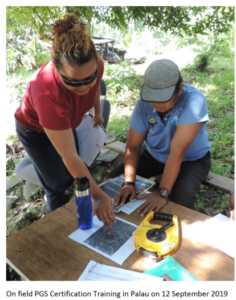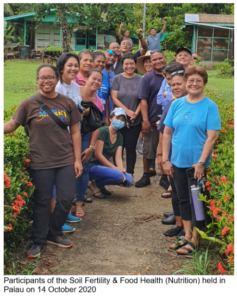Title: Building Prosperity For Women Producers,...
Donor: The Government of Australia, through the Department of Foreign Affairs and Trade (DFAT)
Value: AU$3,884,100
Target Countries: Palau, Republic of Marshall Islands, Pohnpei State in the Federated States of Micronesia, and Kiribati
Project Status: closed
Projected Timeline: 31.07.2018 - 29.06.2022
The Building prosperity for women producers, processors and women owned businesses through organic value chains (BPWP) project works with individuals, families, producers and vendors, and with organic governance structures to promote gender equality and achieve the overall goal of women having access to improved and sustainable livelihoods through participation in organic value chains.

The project aims to achieve the following desired end of investment outcomes by June 2020:
1. Women have increased financial independence and influence in decision-making within the household;
2. Women are increasingly participating in organic value chains, including in decision-making processes;
3. Women and men benefit from viable organic value chains that meet market needs and increase food security; and
4. The Pacific organic sector has more gender-equitable policies and practices.
The project is delivered through a combination of interlinked activities using the following:

Training – the project works with producers, processors and vendors (as household units where relevant) on organic farming and processing practice for improved yield as well as financial management and decision making at the business and household level.
Capacity development – support (advisory and financial) provided to build the capacity of national organic farmers/growers associations to govern/regulate the organic certification process in each project location.
Technical assistance – specialised technical assistance provided to primary actors throughout the value chain to improve the quality and yield of raw produce and processed goods.
Policy and regulatory standards – support the implementation of the Pacific Organic Standards in the pacific through advocacy. The project engages relevant partners including government ministries including agriculture and internal/women affairs, NGOs, farmer organisations and existing programs to advocate for a supportive legislative/policy environment for organic practice and women’s economic empowerment.
Key Activities
Establishment of the National Project Coordination Committees (NPCC)
Palau National Project Coordination Committee
After consultations with stakeholders, and during the first meeting, the decision was endorsed that the Bureau of Agriculture be the chair of the committee, while the project and POGA take on the role of the Secretariat. Other members of the committee represented the Division of Gender, Palau Livestock Association, Pacific Community College – Cooperative Research and Extension (PCC/CRE), and Palau Small Business Development Centre (Palau SBDC).
Marshall Islands National Project Coordination Committee
The Marshall Islands committee consisted of representations from the Ministry of Natural Resources and Commerce, MIOFA, WUTMI, and Majuro Atoll Local Government. The Ministry of Natural Resources and Commerce holds the chair of the Committee, with the project and MIOFA as the Secretariats. PGS and certification training in Palau and the Republic of the Marshall Islands.

Organic Agriculture, Pacific Organic Standards (POS) and Participatory Guarantee System (PGS) Trainings
The project conducted PGS and certification trainings in the Palau and the Republic of Marshall Islands. The trainings aimed to strengthen participants’ understanding of the components of organic agriculture as well the implementation of PGS certification.
The project supported POGA in facilitating a workshop on Introduction to Organic Agriculture and PGS, and a workshop on Soil Fertility & Food Health.
Gender and Value Chain Assessments
The project is doing research and assessment on gender and organic value chains, focusing on acquiring deeper understanding of the value chains from a gender perspective in the two countries. The project is working with national partners to design Women’s Economic Empowerment (WEE) activities that benefit women in organic agriculture, by strengthening their roles and participation, and documenting challenges and opportunities.